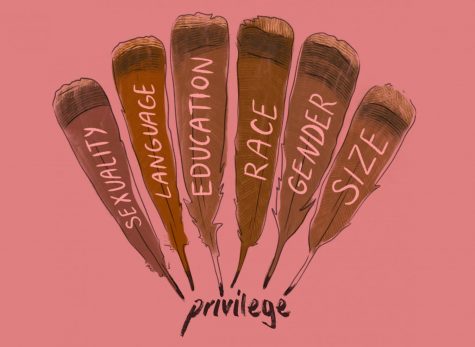Opinion: This Thanksgiving, check your privileges at the door
November 17, 2019

By the time you finish reading this, I can’t promise that you will suddenly be the most “woke” person in the room when it comes to racial discrimination and other systematic forms of oppression and injustice. However, you will be able to question if what you are doing will lead toward a more just and equal society. Trust me, it makes a great Thanksgiving dinner conversation.
Let’s start with the basics: A privilege is a quality out of your control that gives you an advantage over a person or group of people.
There are overt privileges like race, sexual orientation, gender identity, able-bodiedness or social class. However, there are some things I did not consider privileges like age or religion until I attended a seminar through Columbia.
Have you ever thought about your ability to walk up a flight of stairs as a privilege? What about when you go into a clothing store and they have your size available? Or your ability to read this article? Everyone has some form of privilege from which they benefit.
On one side, there is a dominant group, like people who identify as cisgender. On the other, there is the targeted, marginalized group, like people who are transgender, queer or nonbinary.
For myself, I have more identities that fall under a marginalized group. I am a person of color, I was born in a country other than the U.S. and I am female.
The problem is people with privileges are often resistant to accepting the fact that they have privilege. Has anyone ever told you, “Check your privilege”? If so, you most likely became defensive, slightly offended and in denial.
Oftentimes, people do not realize they have privilege because they have never encountered what it was like to not have it. There are parts of our identity that society says, “This makes you better than others.” It’s a status that makes your life easier, whether you deserve it or not.
Having some privileges does not mean you are exempt from other forms of discrimination, either. It simply means, if you are white and English is your second language, you can still be discriminated against because of your lack of “proficient use” of the English language.
However, the responsibility cannot fall on a person from a marginalized community to speak about their lack of opportunity. It only makes them feel more marginalized and is a waste of energy to share if people are not willing to make a change.
So, before you start making your mental list of privileges, understand that it is not about shaming yourself or others about being a part of a privileged group; it is how you and others use your privilege to help those who do not have that luxury.
Checking one’s privileges is uncomfortable and takes a lot of self-awareness. Equality and compassion in society will not get better if those on top do not confront their ability to make things more just and equal for those trying to make their way through life with the cards with which they were dealt.







